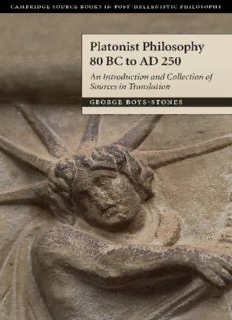Table Of ContentPLATONIST PHILOSOPHY
80 bc to ad 250
AnIntroductionandCollectionof
SourcesinTranslation
‘Middle’Platonismhassomeclaimtobethesinglemostinfluential
philosophical movement of the last two thousand years, as the
common background to ‘Neoplatonism’ and the early develop-
ment of Christian theology. This book breaks with the tradition
ofconsideringitprimarilyintermsofitssources,insteadputtingits
contemporary philosophical engagements front and centre to
reconstruct its philosophical motivations and activity across the
fullrangeofitsinterests.Thevolumeexplorestheideasattheheart
of Platonist philosophy in this period and includes a comprehen-
sive selection of primary sources, a significant number of which
appear in English translation for the first time, along with dedi-
catedguidestothequestionsthathavebeen,andmightbe,asked
aboutthemovement.Theresultisatoolintendedtohelpbringthe
studyofMiddlePlatonismintomainstreamdiscussionsofancient
philosophy.
George Boys-Stones is Professor of Ancient Philosophy at Durham
University and has published widely on Middle Platonism among
other topics. He is co-editor of The Platonic Art of Philosophy
(Cambridge, 2013) and author of Post-Hellenistic Philosophy (2001),
whichlaidthegroundworkforthisvolume.
cambridge source books in
post-hellenistic philosophy
Previoustitlesintheseries:
PeripateticPhilosophy200bc toad 200:AnIntroductionand
CollectionofSourcesinTranslation
robert w. sharples
9780521884808(HB)/9780521711852(PB)
PLATONIST PHILOSOPHY
80 bc to ad 250
An Introduction and Collection of
Sources in Translation
-
GEORGE BOYS STONES
DurhamUniversity
UniversityPrintingHouse,Cambridgecb28bs,UnitedKingdom
OneLibertyPlaza,20thFloor,NewYork,ny10006,USA
477WilliamstownRoad,PortMelbourne,vic3207,Australia
314–321,3rdFloor,Plot3,SplendorForum,JasolaDistrictCentre,
NewDelhi–110025,India
79AnsonRoad,#06–04/06,Singapore079906
CambridgeUniversityPressispartoftheUniversityofCambridge.
ItfurtherstheUniversity’smissionbydisseminatingknowledgeinthepursuitof
education,learning,andresearchatthehighestinternationallevelsofexcellence.
www.cambridge.org
Informationonthistitle:www.cambridge.org/9780521838580
doi:10.1017/9781139050203
©CambridgeUniversityPress2018
Thispublicationisincopyright.Subjecttostatutoryexception
andtotheprovisionsofrelevantcollectivelicensingagreements,
noreproductionofanypartmaytakeplacewithoutthewritten
permissionofCambridgeUniversityPress.
Firstpublished2018
PrintedintheUnitedKingdombyClays,StIvesplc
AcataloguerecordforthispublicationisavailablefromtheBritishLibrary.
LibraryofCongressCataloging-in-PublicationData
names:Boys-Stones,G.R.,author,translator,compiler.
title:Platonistphilosophy80BCtoAD250:anintroductionandcollectionofsources
intranslation/GeorgeBoys–Stones,UniversityofDurham.
description:NewYork:CambridgeUniversityPress,2018.|Includesbibliographical
referencesandindexes.
identifiers:lccn2017019549|isbn9780521838580
subjects:lcsh:Platonists–Sources.|Churchhistory–Primitiveandearlychurch,
ca.30–600–Sources
classification:lccb517.b6792018|ddc184–dc23
LCrecordavailableathttps://lccn.loc.gov/2017019549
isbn978-0-521-83858-0Hardback
CambridgeUniversityPresshasnoresponsibilityforthepersistenceoraccuracyof
URLsforexternalorthird-partyinternetwebsitesreferredtointhispublication
anddoesnotguaranteethatanycontentonsuchwebsitesis,orwillremain,
accurateorappropriate.
Contents
Acknowledgements pagexii
ListofAbbreviations xiii
Introduction:StudyingMiddlePlatonism 1
0.1 Post-HellenisticPhilosophy 1
0.2 MiddlePlatonismasaNewMovement 2
0.2.1 RootsintheLaterAcademy...? 2
0.2.2 …orPartofa‘PerennialTradition’? 4
0.3 DramatisPersonae 6
0.4 UsingthisVolume 10
0.4.1 CommentaryandNotes 10
0.4.2 TheTexts 11
0.4.3 AllusionstoPlato(andOthers) 12
NotesandFurtherReading 12
1 Plato’sAuthorityandtheHistoryofPhilosophy 24
1.1 PlatoasanAuthority 24
1.2 PlatoandtheHistoryofPhilosophy 26
1.2.1 DisagreeingwithPlato 26
1.2.2 MethodologicalImplications 28
1.2.3 Non-exclusiveAuthority 30
1.2.4 Plato’sSources 31
NotesandFurtherReading 33
Texts 38
2 MakingSenseoftheDialogues 50
2.1 CacophonytoPolyphony 50
2.2 ExegeticalPrinciples 51
2.2.1 SourcesforPlato’sViews 51
2.2.2 CriticalAxioms 52
v
vi Contents
2.2.3 TextualCriticism 53
2.2.4 LiteraryCriticism 54
2.3 OrganisingtheDialogues 55
2.4 ReadingPractice 56
NotesandFurtherReading 57
Texts 68
i cosmology 81
3 CausalPrinciplesforaNon-materialistCosmology 83
3.1 AReturntoNon-materialCauses 83
3.2 TheLimitsofMaterialism 83
3.3 MattervsBody,andtheEfficacyoftheNon-material 86
NotesandFurtherReading 88
Texts 92
4 TheDebateoverMatterandtheProblemofEvil 103
4.1 SoWhatIsMatter? 103
4.1.1 Model1:SomethingandNothing.Eudorus,Moderatus
andOthers 103
4.1.2 Model2:PureReceptivity?E.g.Dercyllides,Alcinous,
Maximus 105
4.1.3 Model3:RawMobility.E.g.Plutarch,Atticus,
Numenius 106
4.2 TheProblemofEvil 107
4.3 The‘Suitability’ofMatterforForm 109
NotesandFurtherReading 111
Texts 117
5 ParadigmForms 125
5.1 Introduction 125
5.2 TheNeedforTranscendentForms 125
5.2.1 TheChallenge 125
5.2.2 TheResponse 126
5.3 PuzzlesabouttheForms 127
5.3.1 TheThirdMan 128
5.3.2 TheScopeofForms 130
NotesandFurtherReading 133
Texts 138
Contents vii
6 TheCreatorGod 147
6.1 Introduction 147
6.2 DescriptionsofGod 148
6.2.1 GodasOne/Good/Beauty 148
6.2.2 GodasIntellect 149
6.3 God’sRelationshiptothe(Other)Forms 150
6.3.1 Position1:FormsPriortoGod? 150
6.3.2 Position2:FormsContainedinGod?(E.g.Alcinous) 151
6.3.3 Position3:FormsPosteriortoGod? 152
6.3.3.1 Plutarch,AtticusandOthers 153
6.3.3.2 Longinus 154
6.3.3.3 FormsastheLifeofGod 155
6.3.4 Position4:FormsPosteriortoOneGodandContained
inAnother(e.g.Numenius) 156
6.3.5 PhiloofAlexandria 158
6.4 GodandReligion 160
NotesandFurtherReading 160
Texts 169
7 TheoriesofCreation 184
7.1 Introduction 184
7.2 CreatedTime 184
7.3 Creation 186
7.3.1 TheCaseforSempiternalism 186
7.3.2 TheCaseforTemporalCreation 187
7.3.3 TemporalCreationandPre-Cosmic‘Time’ 190
7.4 CreationandProvidence 191
7.5 ElementsofaCosmos 192
7.5.1 ElementsandQualities 193
7.5.2 ‘NaturalPlace’,andMorethanOneCosmos? 194
NotesandFurtherReading 195
Texts 198
8 WorldSoulandNature 212
8.1 Introduction 212
8.2 WorldSoulasDistributoryMechanism 213
8.3 WorldSoulandCosmicMovement 215
8.4 WorldSoulExtendsthroughtheCosmosbutGoverns
fromtheHeavens 217
8.5 TheConstitutionoftheWorldSoul 218
viii Contents
8.5.1 MathematicalSubstance 218
8.5.1.1 Arithmetical 218
8.5.1.2 Geometrical 219
8.5.2 PhysicalSubstance 220
8.5.2.1 ProblemswiththeMathematicalTheories 220
8.5.2.2 Plutarch 220
8.5.2.2.1 FormsandWorldSoul 221
8.5.2.2.2 FormsintheWorldSoulAreUniversals 222
8.5.3 TheCaseofNumenius 224
NotesandFurtherReading 226
Excursus:DefiningNaturalSpecies 231
NotesandFurtherReading 234
Texts 237
9 IndividualSoulsandTheirFaculties 250
9.1 Introduction 250
9.2 TheRoleofIndividualSoul 251
9.2.1 TheSoulasCosmologicalInstrument 251
9.2.2 AutonomousAgency:ATeleologicalImperative 252
9.2.3 Composition 253
9.3 IndividualSoulandCognitiveActivity 256
9.3.1 PerceptionandMemory 256
9.3.2 Reason 257
9.4 IndividualSoulandPracticalAction 258
9.5 EmbodimentoftheSoul:CountingItsParts 260
9.6 Immortality 262
NotesandFurtherReading 263
Texts 268
10 LivingBeings:Gods,Daimons,Humans,Animals,Plants 288
10.1 Introduction 288
10.2 ACosmosFullofLife 288
10.2.1 Typology 288
10.2.2 CelestialGods 289
10.2.3 Daimons 291
10.2.4 AnimalsAquaticandTerrestrial 292
10.2.5 Plants 293
10.3 Descent 294
NotesandFurtherReading 295
Texts 301
Description:'Middle' Platonism has some claim to be the single most influential philosophical movement of the last two thousand years, as the common background to 'Neoplatonism' and the early development of Christian theology. This book breaks with the tradition of considering it primarily in terms of its sourc

